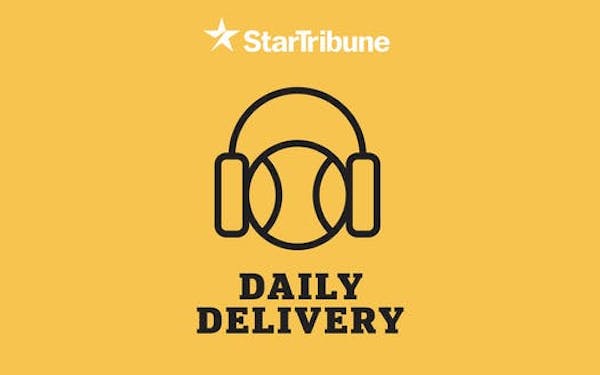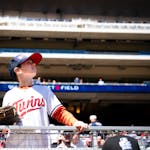 See
more of the story
See
more of the story
There are three ways of evaluating the Twins' trade of batting champion Luis Arraez:
Via heart, head and history.
The heart: Anyone with a pulse is allowed to hate this deal. The Twins on Friday traded Arraez to the Miami Marlins for starting pitcher Pablo Lopez and two position-playing prospects with high offensive upside — Jose Salas and Byron Chourio.
Arraez represents the kind of story every writer wants to write and every reader wants to read. He's a long shot who overachieved, a competitor who treated every at-bat as a crusade, an entertainer in a sea of stoicism, a batting champ on a failed team.
If you don't love Arraez, you shouldn't bother with sports.
The heart is the reason not to trade Arraez.
The head: The Twins approached Arraez about a long-term contract before last season. Arraez decided not to sign. That was wise and revealing.
Wise, because he elevated his value in 2022. Revealing, because it told the Twins that Arraez was more interested in a large payday than security.
The signing of shortstop Carlos Correa leaves the Twins with a glut of corner position players, which included Arraez, Jose Miranda, Joey Gallo, Max Kepler, Alex Kirilloff, Trevor Larnach, Matt Wallner and Kyle Garlick. Shortstop prospects Royce Lewis and Brooks Lee are now corner position prospects or second basemen and the Twins have one of their best hitters, when healthy, playing second base in Jorge Polanco.
They also have an impressive super-utility player in Nick Gordon.
Arraez does what all of the others don't — extend at-bats to double-digit pitches and smack line-drive singles all over the field. But he doesn't hit for power, steal bases or excel as a defender at any position.
The argument that the Twins need to keep their most popular players to draw fans is fraudulent. I've been covering the Twins since 1993. I've seen fans refuse to show up to watch Kirby Puckett, Dave Winfield, Terry Steinbach, Chuck Knoblauch, Paul Molitor, Joe Mauer and Arraez.
Winning teams draw fans, not individual performances. By trading Arraez for a good young pitcher and two talented prospects, the Twins got good value and strengthened their starting pitching.
The job of a general manager is to constantly seek value and fit.
The history: The trade will be unpopular with many fans because Arraez was traded following his best season, in which he won a batting title.
Let's review the Twins' history of decisions made on players at their career peak, starting with Puckett.
After the 1992 season, the Twins signed Puckett to a five-year, $30 million contract, which briefly represented a record baseball deal. They would not have a winning season during the course of that deal, and Puckett would play only three of the five seasons because of suddenly going blind in his right eye in the spring of 1996.
During the '96 season, Chuck Knoblauch, in the midst of his best season, signed a five-year, $30 million deal. Once he signed it, he would never again perform at that level, and would force a trade to the Yankees after the '97 season. The Twins would not have a winning record until 2001.
After he won the AL MVP award in 2009, Joe Mauer signed an eight-year, $184 million deal to stay with the Twins. His OPS that season: 1.031. He would never have an OPS higher than .880 (still an excellent mark for a catcher) the rest of his career while being plagued by injuries.
Puckett, Knoblauch and Mauer were different from Arraez. All three were exceptional fielders and hitters with lengthy track records, but in terms of pure value the Twins would have been better off trading all three at the time they signed them to long-term contracts.
I'll miss Arraez as a personality, competitor and hitter, but the Twins made a logical deal.
Broadcasters like to say that you can't measure heart.
What's certain is that general managers shouldn't use their hearts when measuring.
![Minnesota Twins first baseman Luis Arraez (2) models a new Twins jersey Friday, Nov. 18, 2022 at the Mall of America in Bloomington, Minn.. ] AARON LA](https://arc.stimg.co/startribunemedia/4GTIQZCIJYB7RORSWMJ4WOP3GM.jpg?fit=crop&crop=faces&w=550&&auto=format)





